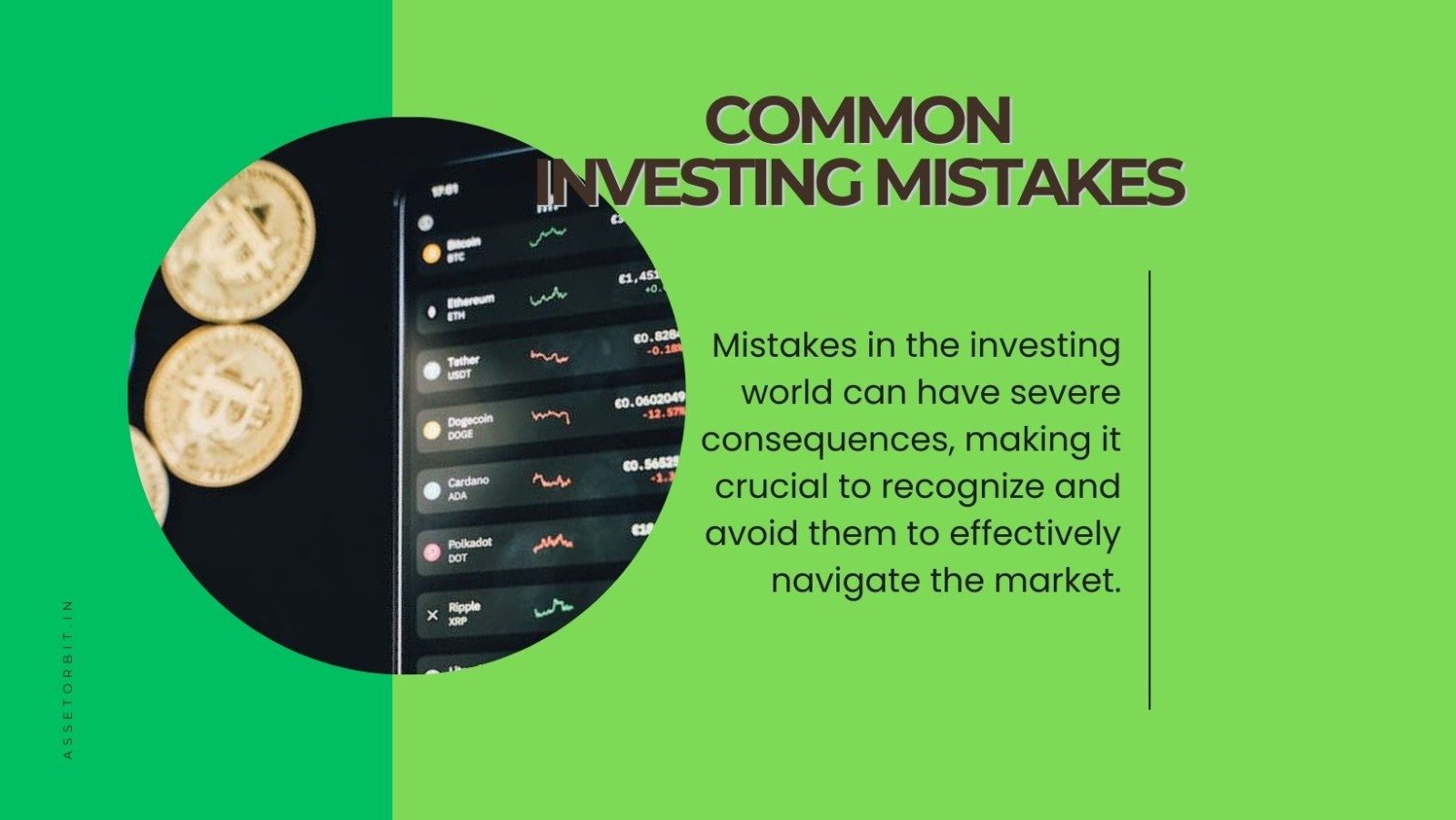Inadequate research, unclear objectives, making short-term price predictions, having unrealistic expectations, blindly following the market, and ignoring research and due diligence are all common investing mistakes. To stay ahead of these risks, investors should prioritize learning new things, diversifying their holdings, knowing their own risk tolerance, and not following the crowd.
In Short
Common Investing Mistakes
Investment may not always pay off, but the key to success is learning from your failures. Anyone, from complete novices to seasoned pros, is subject to making one of many typical financial blunders. These mistakes can have serious consequences at any level of professionalism, from basic to advanced.
It is crucial to be aware of the possible outcomes of each error. These are some of the most common investment mistakes that people make. No matter your level of expertise as an investor, it is essential to steer clear of these common pitfalls in order to successfully navigate the complex world of investing and protect yourself from possible losses.
Which are Common Mistakes People Make When Investing?
1. Not Enough Research
Insufficient research is a common mistake among investors, asking the fundamental question: Can one achieve success in a field with little or no knowledge? For many average investors, the lack of in-depth knowledge about investing is a big obstacle. Unlike traditional education systems in schools and colleges, there is often a lack of formal education in terms of curriculum investment. Therefore, it is imperative to actively seek information about investments. As knowledge increases, risk decreases with it. Recognizing this, aspiring investors must understand the importance of continuous learning and thorough research in the investment world.

2. Lack of Defined Investment Goals
Success is elusive without a clear goal in mind. Unfortunately, many investors lack a clearly defined goal. It’s similar to navigating without a destination. Frequently, questions like the investment’s objective, the target to achieve, and the conditions for reducing losses remain unanswered. Clarity in addressing these questions is the key to a successful investment journey.
3. Emotional Investing Mistake
Often, emotional investors follow the crowd, basing their financial decisions on the activities of others. For example, if everyone is eagerly buying a specific stock, an emotional investor may feel obliged to join in, even if it goes against their long-term investment strategy. This herd mentality might result in rash decisions that do not fit with one’s financial goals.
4. Short-term Price Prediction
Despite common knowledge that it is not the best technique, many investors continue to engage in this activity. Predicting short-term price swings is a difficult, if not impossible, effort, and attempting to time the market sometimes results in costly errors. Instead of attempting to buy at the lowest or highest price, a more productive technique is to focus on long-term investment approaches.
5. Putting All of Your Eggs In a Basket
This mistake occurs when an investor concentrates all of their investments in a single asset or asset class, raising exposure to the risks associated with that specific investment. Diversification is not only beneficial for equities, but it is also a key principle for risk management across the entire investing portfolio. Investors can reduce risk and improve the overall stability of their portfolio by diversifying their investments across diverse assets, sectors, and businesses.
6. Misinterpretation of Risk Tolerance
This mistake happens when investors confuse their ability to withstand risk (risk capacity) with their emotional comfort level in taking dangers (risk tolerance). Risk capacity is more objective and refers to an investor’s financial ability to withstand market volatility, taking into account aspects such as income, assets, and time horizons. On the other side, risk tolerance is a subjective measure of an investor’s emotional resilience to market volatility.
7. Unrealistic Expectations
Some investors’ experiences serve as a cautionary tale. Motivated by false expectations, this person invested in a specific stock, envisioning it as a penny stock with the potential for rapid returns. Short-term gains were possible, but overall expectations were not met. Faced with reality that fell short of high expectations, the investor either saw reduced returns over time or suffered losses. In such cases, impatience may lead to impulsive actions, forcing some to leave the investment field entirely.
8. Following the Crowd
Human psychology frequently emphasizes what others think or do. Many novices, influenced by social media and current market sentiments, base their decisions on the actions of others. This tendency can result in a reliance on rumors and an increased likelihood of making poor investment decisions. Investors must realize the impact of herd mentality, remain independent in their analysis, and make judgments based on careful research and an understanding of their financial goals.
9. Quick Gains Without Allowing Time
Some investors prioritize immediate profits and fail to allow sufficient time for investments to mature. They frequently engaged in quick buying and selling due to the desire for immediate results. As a result, the investments did not have the opportunity to reach their full growth potential. Wealth growth through investments is a gradual process that demands patience and a long-term mindset.
10. Market Watching
Warren Buffett and Nicolas Darvas advise against constantly monitoring markets, focusing on spending minimal time, and avoiding fixation on market fluctuations for substantial profits. Nicolas Darvas did not spend much time learning the intricacies of the market. Instead, he waited until the market closed to determine prices.
11. Focusing on Past Performance in Investments
When the current value of an asset rises, there is a natural tendency to increase investment. This norm can trap ordinary investors while professionals profit. It is important to note that past success does not guarantee future benefits, highlighting the importance of an in-depth analysis that takes into account both historical performance and an asset’s underlying qualities.
12. Overlooking the Importance of Research and Due Diligence
Investors may sometimes overlook the importance of conducting thorough research and due diligence before making investment selections. Relying on rumors, tips, or insufficient information can lead to poor decision-making and greater risk. Conducting extensive research, recognizing market trends, and scrutinizing the fundamentals of potential investments are all crucial stages toward making well-informed and strategic judgments.
Final Thoughts
Take an honest look at yourself. Is your vision imaginative? Do you honestly want to become a successful and rich investor? Success in investing, like in any other subject, requires deliberately avoiding these tiny mistakes.
A little mistake can lead to serious consequences; therefore, developing the discipline to correct errors is vital for success in the world of investing. Without a dedication to rectifying errors, success stays distant. As a result, following a precise discipline for mistake-fixing is crucial for achieving success in the world of investing.
FAQ
Which investor is making a common investment mistakes?
Identifying a common investment mistake is vital, and it is frequently caused by an investor’s lack of knowledge about the basics. This person may not completely understand key concepts such as terminology, associated risks, and market dynamics, resulting in poor decision-making and probable losses. Emotional decision-making is another common mistake in which investors make decisions based on emotions rather than rational principles, such as buying stocks on tips or holding onto losing equities out of emotional attachment.
Why do most people fail at investing?
Firstly, a lack of knowledge is important since people frequently jump into investing without a basic understanding of how it works, including the terminology, risks, and market dynamics. This information gap can lead to poor decision-making and eventual financial losses. Emotional investing is another typical problem, as actions affected by emotions rather than good principles can result in buying stocks based on suggestions, holding onto losing stocks owing to emotional attachment, and making poor overall investment choices. Furthermore, a lack of patience impedes success, as many people desire rapid gains without realizing that investing takes a long-term perspective. Recognizing and managing these aspects is crucial for developing an effective investment strategy.












Leave a Reply